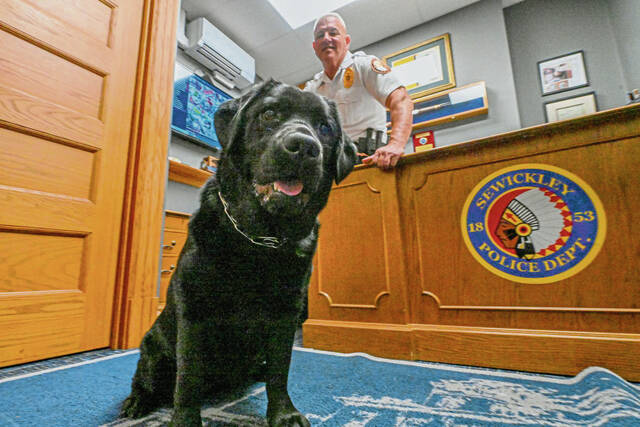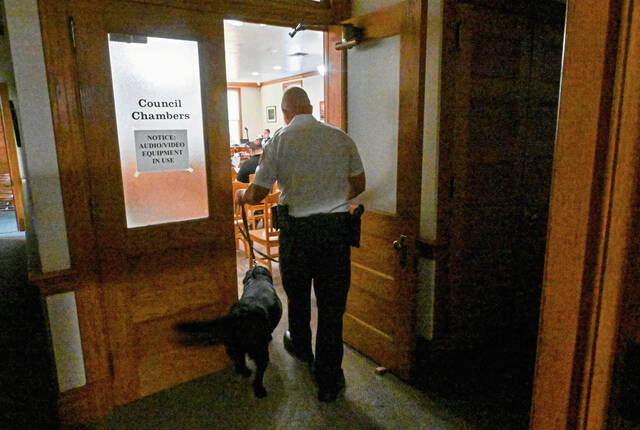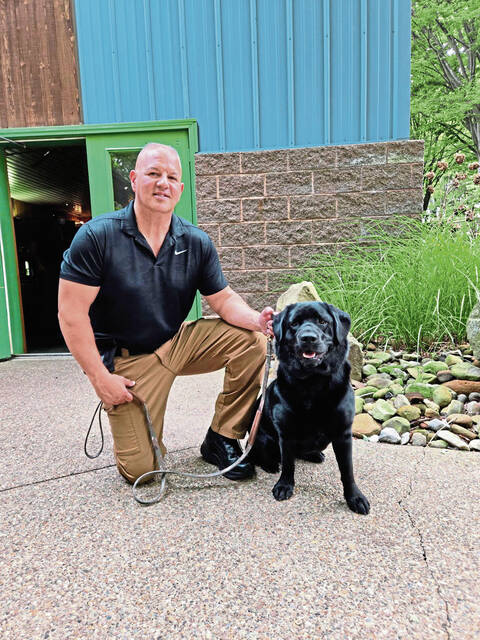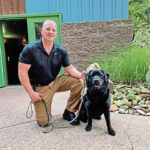The Sewickley Police Department recently welcomed a new furry friend to the force.
Harley, an 18-month-old English black Labrador, has become the borough’s first certified therapy dog.
Owned by police Chief Dave Mazza, the canine citizen, as she is called by trainers at Franklin Park-based Misty Pines, received her certification on June 7.
The council unanimously voted June 10 to enter into an agreement with Mazza, making Harley an official department member.
The borough will cover Harley on its insurance. Mazza will be responsible for food, veterinarian care, training and related expenses.
“Chief Mazza has found that Harley is a calming influence and provides comfort to children and adults who may need some encouragement,” council president Cynthia Mullins said. “She is a welcome addition to the community and borough family.”
The chief said he was pleased with the deal because Harley was never meant to become a working dog.
She was originally obtained as the family’s fourth pet and hunting dog and her community use was discovered through happenstance.
Mazza said he would bring Harley to work on occasion as a puppy and take her to bus stops and school visits.
“I was told that some kids seem to have better days after visiting with Harley,” Mazza said. “It was at that time I explored getting her certified as a therapy dog.”
Training program
Harley was trained, like all of Mazza’s other dogs, at Misty Pines off Wexford Bayne Road.
She began therapy dog training at about six and a half months old in July 2024, following several months of regular obedience training.
Misty Pines training manager and therapy dog evaluator Kelly Grace said it can take two to two-and-a-half years to become a “good dog,” and three years to earn therapy dog certification, depending on the trainer and animal.
“Every dog is different,” Grace said on June 17. “Some dogs learn faster. Harley was a quick learner.”
Training usually begins with an evaluation. Therapy dogs need to like people and be comfortable around people.
“They can essentially encounter a lot of things while out visiting different places that request (therapy dogs),” Grace said.
Animals that move on to therapy training are taught to be able to sit and stay for at least two minutes without getting up.
They also must be able to lie down for at least five minutes without getting up, regardless of stimuli, including people walking around, petting them and moving around in wheelchairs.
The dog must be able to respond to a call from across a room without stopping for treats or picking up other objects. Communication is key during training.
“That speeds up the process,” said Grace. “When the handler’s a better handler, they’re able to communicate quickly. It makes the learning process faster. If you get a smart handler and a smart dog, they test well.”
She said Mazza and Harley made an outstanding team.
The chief said Grace warned him Harley may not be certified the first time around.
Regular class attendance and some home schooling helped Harley progress faster than other dogs, according to the chief.
“I did exactly everything that Kelly taught me and assigned from the lessons at Misty Pines,” Mazza said about the process. “I was consistent with two 10-minute lessons at home on what Kelly taught me. If I ran into an issue where the dog wasn’t listening, I knew it wasn’t the dog that was the problem. It was me. Nine out of 10 times, it’s the handler that’s making the mistake.”
Mazza also credited Harley’s exceptional breeding from Winchester Labradors in Smethport, McKean County.
Therapy dogs must complete several annual classes to maintain their certification.
Grace took great pride in learning Harley would be used to help first responders and others in their time of need.
“There’s nothing more rewarding than to see things like that happen,” Grace said. “All we want is for people to feel like they’re making a difference. We’re able to do that through our therapy dog program. It’s an important service that can be offered in the community. Proud is the only word that I could describe it.”
Grace recommends that all dog owners participate in some form of obedience training.
“We have a responsibility to have good canine citizens that are safe,” she said.
Mazza said the therapy dog training has not impacted Harley’s hunting prowess.
“She knows when it’s time to go to work and when it’s time to play,” Mazza said.
POST position
Harley not only has a home at the Sewickley police station, but also with the nonprofit Police Officer Support Team.
The group was founded about 25 years ago by retired state nursing supervisor Patty Morgan and retired Pittsburgh Police Sgt. Bill Burk to help first responders deal with traumatic situations.
“We’re a critical incident stress management group,” said Morgan, who worked in the forensic psychiatric unit at the former Mayview State Hospital in South Fayette.
“Officers or families will call in with everything from job stress, relationship problems, emotional problems with their children. It’s not easy to be a cop’s kid.”
Morgan has a lot of respect for law enforcement.
Her grandfather, the late Frank K. Morgan, was one of Pittsburgh’s homicide detectives in the early 1900s. Her father, Lawrence Morgan, was a district judge in Greentree. She also has several other relatives who served as police officers.
POST is headquartered in Scott Township. It is comprised of about 22 retired and active law enforcement officers, mostly from Allegheny County and at least one from Washington County.
POST paid $3,000 for Harley’s training. Morgan planned to welcome Harley as POST’s first official therapy dog at its meeting on June 19.
“Harley is such a sweetheart,” Morgan said. “Short, stalky and eminently huggable. There’s such value in pet-facilitated therapy and Chief Mazza is just so committed to this. He cares, he really cares. There are many, many things in the past that we could have used Harley with had we had her.
“The fact that the dog’s there and the dog’s calm, friendly and nonjudgmental, whether an officer comes over and interacts with the dog or if the dog’s just there, it sets a tone of calmness.”
POST gets called out to communities and departments about 20 times a year and fields countless phone calls. Conversations are confidential. They also help corrections officers at the Allegheny County Jail.
Mazza said he has been using POST for at least 15 years to help officers through various difficult situations, including a fatal fire in December 2022 in which two Edgeworth Elementary students, Wylde Lightner and Lyric Keys, died inside a burning home along the 500 block of Miller Way.
Mazza believes a therapy dog would have brought comfort to more than just his officers during that time.
It is unclear how long Harley will be in service.
Mazza hopes to have her working for at least eight years.
“I would have been thrilled to have her as a companion and a hunting partner and a family member, but the fact that this took me down the road where she is going to help others, I’m thrilled about it,” the chief said. Harley is expected to be at the station on Tuesdays and Thursdays.
For more information and to support POST, call 412-855-4009. Officers who want to use POST services can call 888-387-2214.













